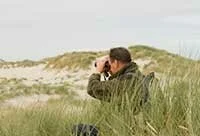The Binocular Site
Waterproof Binoculars: Essential of Outdoor Enthusiasts
 Waterproof binoculars offer optical improvement in every environment. Not only do they protect against rain and leakage, they also prevent fogging. This can be an essential feature, whether you’re on the family yacht or hiking when rain hits.
Waterproof binoculars offer optical improvement in every environment. Not only do they protect against rain and leakage, they also prevent fogging. This can be an essential feature, whether you’re on the family yacht or hiking when rain hits.
They’re also great when in high-humidity situations or when dew is heavy at dawn, ensuring your birdwatching trip is not canceled by a little bit of rain.
By using waterproof binoculars you can hike without fear, hunt whenever it’s convenient, or safely see better while out fishing. The self-contained parts of a waterproof set of binoculars will also be safe from crumbs, dust, and dirt.
Finally if you store your binoculars on the boat or in the campsite for easy access, waterproofing will ensure mildew cannot possibly affect your binoculars’ performance.
Consider The Possibilities
Waterproofing is achieved through the use of rubber O-rings and nitrogen gas purging. Although rubberized casing can help durability please ensure your binoculars are listed as waterproof. The rubber exterior does not guarantee safety from fogging or water leakage. Still, consider looking for waterproof binoculars with rugged shells for use while boating or in other environments where a drop may be possible.
Also be sure to choose sets designed to be easily and safely gripped while remaining comfortable. Some sets are offered in high contrast colors such as yellow and black to help keep them easy to find in foggy or rainy conditions while boating.
If you plan to be outdoors hunting or hiking or on a moving boat it can certainly make a big difference to invest in straps that are comfortable and a case that is durable as well; again you need to balance ease of use with protection from knocks and drops.
Waterproofed binoculars are available both in regular sizes as you’d expect and in compact sizes for ease of use. And if you want to get compact ones, take a look for binoculars with Roof prisms, which are often smaller.
You don’t want to worry about flimsy, delicate equipment while on your adventure, and uncomfortable binoculars will simply not get used. You might also consider monoculars or the extended optics choices available such as scopes.
Marine Use
For marine use 7x magnification is usually considered the maximum strength to work with since they can be more easily handled, will have a wider field of view (FOV), and won’t need lots of fussing with focusing.
Focusing using waterproof binoculars can be a pain since the added protection involved in preventing leaks can make the focusing instruments hard to work with, so a wider FOV will help minimize that. Still, there are models offered with both center focus and individual eye focus, so be sure to try various kinds to find the one that you find most comfortable.
Another excellent feature for marine use is the built-in compasses available with some binoculars. Some sets even offer beta light inside the compass so it is usable while night sailing, which ensures that magnetic parts remain uncompromised. Be sure however that the compass in your set works world-wide, as some models have a compass only usable within the northern hemisphere.
While yachting you can also consider the benefits of night-vision binoculars that can keep land in sight and identify objects during low-light situations. These are often used by the military and can be used along with infrared equipment to keep track of breaking waves and wash, day or night.
You will also want to choose binoculars with a large objective lens size such as 45mm and up if possible, to ensure your set will work whether you’re in poor boating conditions or its twilight.
Stabilized binoculars may be of benefit too when available, as they help keep images steady during the minor bouncing you can expect in high-speed boats or regular sailing. Although they can’t compensate for bucking and rolling during a storm, they can be very helpful during everyday use.
Be sure to check the label carefully, as some binoculars will be listed as water-resistant, weather-resistant, or splash-proof. Although these types will have some protection against moisture, only binoculars listed as waterproof will be guaranteed against water damage.

